The debate about free trade
2023年银行招聘之银行招聘综合知识能力提升试卷B卷附答案
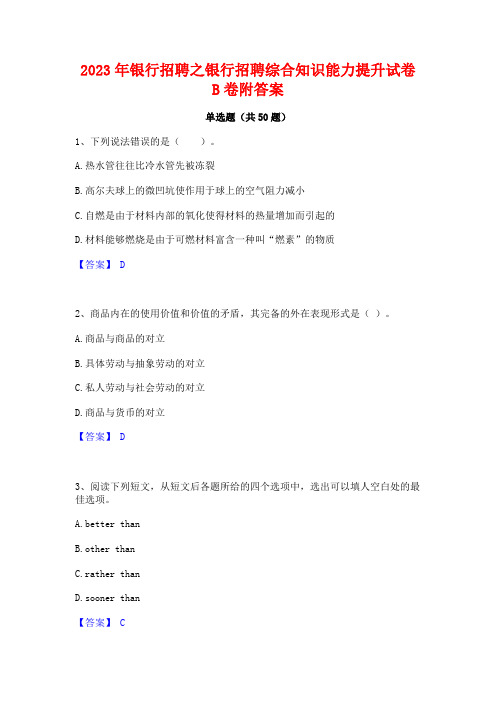
2023年银行招聘之银行招聘综合知识能力提升试卷B卷附答案单选题(共50题)1、下列说法错误的是()。
A.热水管往往比冷水管先被冻裂B.高尔夫球上的微凹坑使作用于球上的空气阻力减小C.自燃是由于材料内部的氧化使得材料的热量增加而引起的D.材料能够燃烧是由于可燃材料富含一种叫“燃素”的物质【答案】 D2、商品内在的使用价值和价值的矛盾,其完备的外在表现形式是()。
A.商品与商品的对立B.具体劳动与抽象劳动的对立C.私人劳动与社会劳动的对立D.商品与货币的对立【答案】 D3、阅读下列短文,从短文后各题所给的四个选项中,选出可以填人空白处的最佳选项。
A.better thanB.other thanC.rather thanD.sooner than【答案】 C4、我国古代“以农立国”,而农业生产和自然天象的关系密切,所以古人非常注重“观时授时”,积累了丰富的天文历法知识。
以下关于我国古代天文历法知识,说法错误的是()。
A.金星古称“明星”“太白”“启明”“长庚”;木星古称“岁星”“岁”B.杜甫诗中的“人生不相见,动如参与商”中的“参”是指西方的“参宿”.“商”指东方的心宿,“参”“商”同属二十八星宿C.古代用于纪年的方法很多,其中最常用的是干支纪年法和年号纪年法。
其中干支纪年法是指以天干和地支两两相配以纪年,历经六十年一轮回D.天干只能与地支相配,而且是天干的单数与地支的双数相配,天干的双数与地支的单数相配【答案】 D5、资料:Large industrialized are now in a recession. What are the prospects for economic recovery?A.deficitB.surplusesC.declineD.recession【答案】 A6、资料:You can not go forward by going backward. Take the current debate about trade and globalization, for instance, while the impulse to erect trade barriers is understandable given the pain experienced in recent years, it is not the way to create lasting growth and shared prosperity.A.Trade and globalization are debatableB.Erecting trade barriers can not bring growth and prosperityC.Trade and globalization have caused severe pain in recent yearsD.Opposing trade and globalization is understandable and reasonable 【答案】 B7、企业会计核算必须符合国家的统一规定,这是为了满足()要求。
21世纪大学商务英语综合教程第三册课文英汉对照翻译ByMJX

UNIT1 Free Trade Has Enriched the World with More than Diverse Goods自由贸易给世界带来的不仅是丰富多彩的商品By Daniel GriswoldTune in to cable TV, talk radio, or the blogosphere and you will soon be hit over the head with the message that free trade is destroying America. According to the economic populists on the left and right, the wages, jobs, and futures of Main Street Americans are being sacrificed daily to the gods of globalization.只要打开有线电视、收音机或博客网,你很快就会惊讶地获悉:自由贸易正在摧毁美国。
据左右两派经济民粹主义者所说,美国普通老百姓的工资、工作和未来天天都在被当作供品献祭给全球化的神明们。
On trade, as on so much else, the populists have it wrong again. Free trade and globalization are great blessings to American families. Trade is delivering lower prices and more variety to consumers, especially the poor, while creating better paying jobs for the middle class. Beyond the US shores, the spread of economic openness is building a more peaceful, democratic and humane world for our children.就像在其他许多事情上一样,这些民粹主义者们在贸易问题上又搞错了。
free trade under fire商务英语

目录一、引言二、自由贸易的定义和优点三、自由贸易的挑战和争议四、自由贸易的未来发展五、结论一、引言自由贸易一直以来都是商务领域中的热门话题。
随着全球化的推进,各国之间的贸易往来越来越频繁,自由贸易的理念也在全球范围内得到了广泛的关注和讨论。
然而,自由贸易在近年来却受到了一些国家和地区的质疑和挑战,引发了一系列辩论和争议。
本文将就自由贸易的定义、优点、挑战和争议以及未来发展进行探讨,旨在深入了解自由贸易的现状和发展趋势。
二、自由贸易的定义和优点1. 定义自由贸易是指各国政府不对进口商品征收关税或限制进口数量的贸易方式。
在自由贸易的框架下,商品可以自由地在各国之间进行流通和交换,不受到不合理的政府干预和限制。
自由贸易的核心理念是在市场经济的基础上,建立开放的贸易体系,促进商品和服务的自由流动,为各国经济的发展和繁荣提供有利条件。
2. 优点自由贸易的实施可以带来诸多优点。
自由贸易能够促进资源的优化配置,利用各国的资源优势,加强国际间的合作和互补,提高资源的利用效率和生产效率。
自由贸易有助于拓展市场,增加产品的销售渠道,提升企业的盈利能力。
再次,自由贸易可以促进技术的转移和创新,激发市场竞争,推动企业不断改进和提高产品质量,推动经济的发展。
自由贸易还可以降低商品价格,提高消费者福利,促进消费增长,推动经济的繁荣。
三、自由贸易的挑战和争议1. 挑战尽管自由贸易具有诸多优点,但在实际运行中也存在一些挑战。
自由贸易可能会导致一些行业和企业的衰退和失业问题,特别是一些传统产业和就业岗位可能受到冲击,给一些劳动者带来不利影响。
自由贸易可能会导致贸易逆差和汇率波动问题,影响国家的外汇储备和经济稳定。
再次,自由贸易可能会引发一些贸易摩擦和争端,导致国际关系紧张和不稳定。
自由贸易也可能会引发一些环境和资源的问题,对自然环境造成一定的破坏。
2. 争议自由贸易在实践中也引发了一些争议。
一些国家和地区认为自由贸易有利于经济的发展和繁荣,支持积极推动自由贸易,加强国际间的合作和交流。
2015届江苏省宿迁市剑桥国际学校高三上学期12月月考试题 英语
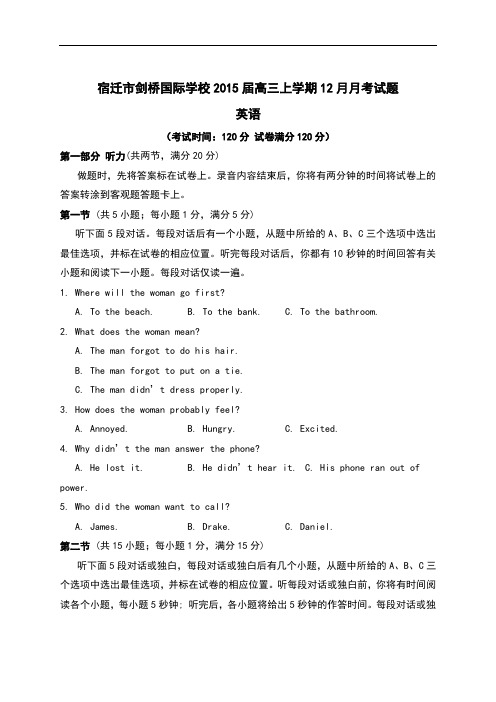
宿迁市剑桥国际学校2015届高三上学期12月月考试题英语(考试时间:120分试卷满分120分)第一部分听力(共两节,满分20分)做题时,先将答案标在试卷上。
录音内容结束后,你将有两分钟的时间将试卷上的答案转涂到客观题答题卡上。
第一节(共5小题;每小题1分,满分5分)听下面5段对话。
每段对话后有一个小题,从题中所给的A、B、C三个选项中选出最佳选项,并标在试卷的相应位置。
听完每段对话后,你都有10秒钟的时间回答有关小题和阅读下一小题。
每段对话仅读一遍。
1. Where will the woman go first?A. To the beach.B. To the bank.C. To the bathroom.2. What does the woman mean?A. The man forgot to do his hair.B. The man forgot to put on a tie.C. The man didn’t dress properly.3. How does the woman probably feel?A. Annoyed.B. Hungry.C. Excited.4. Why didn’t the man answer the phone?A. He lost it.B. He didn’t hear it.C. His phone ran out of power.5. Who did the woman want to call?A. James.B. Drake.C. Daniel.第二节(共15小题;每小题1分,满分15分)听下面5段对话或独白,每段对话或独白后有几个小题,从题中所给的A、B、C三个选项中选出最佳选项,并标在试卷的相应位置。
听每段对话或独白前,你将有时间阅读各个小题,每小题5秒钟; 听完后,各小题将给出5秒钟的作答时间。
每段对话或独白读两遍。
经济管理专业外文翻译--文化产品,市场和国家关系和国际自由贸易体制Culturalgoods,mar

外文原文:Cultural goods, market and national relations and international free tradesystemJim Mc GuiganAn example in cultural studies is the most popular today "cultural economy" - on economic and cultural thoughts to check it, rather than as an industry as a kind of words. Cultural historians will say the trend is difficult to Atlantic new party. In 1992, British media academics Jim MaiGuiGen blamed on contemporary paradigm crisis culture research, its separation from cultural and political economy. He put forward louder appeal and a pair of consumption culture mode of production as the center. His proposal also a populist criticism, leading, consumption as the center, with value of examples of the audience, ' 'positive is a sovereign consumption subject is who (imagine is) not industrial control economic and cultural existence reason McGrigan, 1992). MaiGuiGen, of course, quite a person in his own time. How to put back on the bottle - for the elves in 'economic recovery mode, avoid it enters' key back to marxist economic rights fatalism - is still a provocative, but not out of the mission.In 1992, when the humanities center at Wesleyan university in Massachusetts, theorist and culture combined each 1 team director in American culture industry for a term called seminar "producing and sales culture" (Mr Mann, 1996). This is an amazing attempt, sponsored by Coca-Cola Coca-Cola foundation, academic access to cultural criticism of the industry, how the latter imagine market research and consumer, and asked them if they intentionally create and shape our hope.The research methods, launched a module, this conference most close to overcome epistemology is divided into production center and consumption as the center of the method, material conditions in culture understanding query, namely as a department. Fastforward to the early 21st century, the economy of the "culture" currently hype culture and media research won additional value, because this time, it is not only the scholars in the ivory tower who is support the analytic reasons. More important is, 'a cultural turn' in its momentum gathered enterprise sector, according to 'culture' plays a key role in the economic aspect, and marketing practices, on the one hand, the performance of the organization, enhance the other. However minor a trend, and also it is notable that in economic discipline, a key economic geographer proposed quality as a cultural economics a set, discourse structure, positive frame market. Therefore, before the market does not exist at the 2002 ·), described some of its objective, transcendental method (DE guay and discourse. Economic theory is regarded as an economic structure, positive ensemble shaping reality (Karen, 1998, 2000).The political, cultural, and policies.I MaiGuiGen in agreement with early in a standoff in 1990s about this is cultural investigation. Like him back after, I think the simple answer is retrieve a lost causes materialism of the return of the traditional culture research political economics. In order to do this, I will devote myself to the production of material culture study. The trajectory of the economy and culture, however, there is a warning. It runs the risk of triggered by the central concern of cultural research subject identity, namely the cultural politics. Double challenge, I want to take a project, through policy research key, is located in the method to yourself the hand on the cultural and economic ties between a between, and politics and policy, such as in. Let me explain more. Mainstream culture has to stay in my two aspects of the field in a world analysis differentiation. In their planning things, 'political commitment' need to assume the criticism and boycott; ` policy, on the other hand, is with security, hegemony, and the status quo. This is understandable mainstream culture research (its staple fare, that criticism power) fired policy guidance culture research committed revisionist rebels who thought the betrayal of from margin (1 title in the study of regional culture of privileges) to center, where ` power 'is institutionalized policy form, corruption and the absolute necessity.We wouldn't be sitting here today in this seminar, and if we believe such a partial idea of effectiveness. This is one-sided, because it does not acknowledge both desire and possibility of the bridge academic workers political criticism and participate in the gap between. For those of us who today to share a concept: a critical frame policy research provides a breakthrough point these transitional activities. It specifies a scholar BBS, to meet the decision makers and analysts who are willing to engage in multidisciplinary policy discussions. Most importantly, the two organizations dedicated to the possibility of social transformation in China has incremental reform through the regulatory system, from the backdrop of cultural production ` 'means a more complex than what the process of the cultural and economic mode can be alone provides. For us, even started thinking, cultural policy areas regulatory policy changes, we must first recognize that 'culture' cannot simply follow market principles, because it is in the same time "means and purpose of social regulation and government" (Bennett, 1992,26), therefore, 'culture "is the supervision system, constitutive can be considered as indispensable rationality government. This culture/government couplets, should be given equal weight so the analysis of the correct culture tendency research emphasize the link betweencultural/market.In addition, we must not be concept misleading is, the close relationship between 'culture' and 'government' is China alone. Even America and Britain ruled kingdom deregulation of speech, still be on time, price and transmission standard content television industry especially in land departments (hyjal Lin, 2001) pelosi. ` culture'should be whether consciousness, like a commodity in the center of the international debate is underwayThe feasibility of about culture cross-media border trade. In Canada, Europe and more recently in the United States (on media ownership debate is involved, the federal communications commission's ruling heart), countries and cultural policy instrument to delimit the national cultural market active participation. Throw open the resistance of national culture, therefore, is not just China market integratedly.Research problems,I think pieces are as follows: what constitutes a query the cultural market the policy management? And they should go to where? Like other policy areas, China after joining the WTO, cultural policy has become such turmoil and controversial areas, it stripe easier than ever to different thoughts and prescription. Intervention I still should notice, nonlocal flux because in such a culture industry "as a policy of birth" classification of just recent. It can be traced back to 2001, when the 10th five-year plan made conspicuous place, for the first time chanye for reform to mandarin era began. From the current challenges of opening China's wto content industry provides country further encourage development think-tank music college in Hong Kong academy for performing arts in service as the young talents emerging cultural industries. Then, last year, two main research institutions "national culture industry" also launched one after another, in the north, in Beijing university, in Shanghai jiaotong university in the south. Meanwhile, the blue of cultural industry each year the institute of social center issued by Chinese culture research in science. In China, academia provides a feasible policy Suggestions, location and application humanities spirit is an obvious reality cultural issues more and more policy. The domain Research problem-based now let us return and fulfilling method and my big framework research problems specific problems group. Thought what the purpose is' culture 'and' economic ', 'political and policy in the series service to our policy review Chinese culture? This makes my table 3The basic premise that is a built-in: on1. Cultural need to be understood as an economic sector, namely 'culture industry' as the state regulators;2. Culture is a continuous development of relations, economic and policy areas, and trade;3. Culture is the goods, but not like any other commodity.All these building ground floor is my big is big not ask: if the United States theory'market' itself is a kind of word building, as China? Final model in the media industry in particular, China should take back sharply to the country's pattern is similar to the U.S. public cultural products. Rolling provide This has taken on two levels, and in the county TV media and board level of small-scale news units across the river. Whether to adopt aderegulation in over big media collectivization form and content? How Europe, cultural market? In decision-making and debates, the European affairs committee new regulation means? With democracy is cultural commercialized, the final answers cultural consumption space, and create a diversity of cultures? These problems are more complex, because they are how to answer team under the language environment after the test. That is to say, the rapid changes of the answer, because we hope our countries turn of problems, from terrain democratic U.S., Canada and Western Europe to China, political credentials in the best inconsistent. These problems, but a more inquires after our discussion, will clarify the Chinese model cultural policy should choose as a media industry is slowing sculpture out more autonomy space. For this reason, we must study these problems triggered set twenty years in the international debate long-term international free trade from cultural exemption launched between the United States and Britain in a refugee camp in the European Union and Canada and countries in the opposite faction found. No matter whether we in Europe/Canada pattern or American model will better service in China, we need to realize that the YinXiangJie, domestic policy in the sovereignty of isolation international cultural policy, no longer strong resistance. Although there are What advantages and disadvantages of the establishmentof a global integration of cultural policy system?Seriously consider specific problem I will now in concrete ground task I generally buildings. The first premise we need to watch closely industry of Chinese culture, the second premise existing regulatory conditions, make our international trade of culture at home against the debate. The third premise a series of questions caused, namely: (a) cultural products should be traded? (2) market is established in Chinese state media border to differentiate commercializable goods and the commercializable is reasonable; And allusion, (3) what is a better system from other kind of calibration? (4) what appropriate policy tools will be most effective in governance goods circulation and traded in the Chinese culture areas? Finally, as a thought, I care more about the problem and put forward and provide at this stage, must be better than the answer.China's culture industry market access method: mixed cargo rules.As mentioned above, the official discourse mandarin chanye as was formally established in 2001. Because then the enterprise concept jituan "double formula" "have already appeared in the occasional government documents suggest, the news media departments, but store the" dressed in front of the public institutions they like to do, "the commercial business enterprise"." But until the 16th party congress in 2002, the state propaganda machine and substantial, has officially difference enterprise concept, with "the public culture of the organization's business culture (mandarin" by "(mandarin) chanye), attributed to each clear mission, different means and objective development. The state's logic is a one of the hair division. We know, the development of China's culture industry control to solve the problem. To enter the market main interesting is that the market threshold into different points division department. Therefore, the traditional defies generalisations Chinese culture industry is' commercially 'did tell us very little about China itself, and the cultural landscape for many investors to reduce the influence of domestic policy and foreign. -What is the basic rule of cultural industry, the management of capital into which sub industries were officially designated as "commercializable" (you yingli xing), this is no, this is considering threshold category? Commercializable department was not deemed too sensitive national culture and information security. They include performance, tourism, industry and culture exhibition, technical production and sale of audio and video products, sports and entertainment, higher education and vocational education. They are opening up the domestic collective and social capital and foreign capital. Existing capital of the designated department of the state, and he ordered by as intrusive, but through annexation gradually exit and transferred asset sale, nearly ups and downs, and bankruptcy. Scale the next supervision danweis highly relevant state-owned monopoly position of cultural identity formation and information security. In this large category, not the commercializable commercializable Beijing distinguish from department. The latter include: obligation education, the agency responsible for national cultural relics preservation, libraries, museums, cultural workstation, most departments need and monopoly state-owned capital ownership. Whether domestic or foreign capital is allowed.Regulations become more complicated, because our approach to commercializabe, monopoly before category - cultural domain news, broadcasting and television. Capital into these industry is highly controversial and national unstable because policy of volatility.Authorized monopoly capital media giants, but to exit the small and medium-sized media company. Criterion, reiterated that the basic principles - policy matters - the same size, take the basic principles of the claw big regulation measures adopted a filial piety (" grabbing big, release small ") has taken department on the first and the second. Problem is, although what complex medium diversification and corporatization media organization allow absorption domestic capital, in theory, they will only be allowed to invest in the media industry. Another limitation is that only certain sub industries of small and medium-sized media were allowed in absorbing external capital, namely points and department limited to basic facilities such as printing and publishing services related value chain, retail, information transmission and distribution, the main points unit, nothing can do and content of offer. Therefore, even though their names to shareholders, the media are banned from department of domestic investors intervention the enterprise production content and asset management. With foreign investors hold so, if bertelsmann, its sphere of influence to be included in the publishing industry time only. As shown above, capital inflows has been allowed to focus on what is considering the basic structure of the media in the industry by department. How in printing, the content of the department news, broadcasting, television media? Mark ` commercializable in blue books. ', but in fact it is how to commercializable?What is the market thresholdEntry in the domestic and foreign capital domain specific? In the media content industry of foreign investment, first of all, we have to understand that China's entry into wto agreement not bound to the content of liberalization. Domain for foreign capital investment, the hurdles is insurmountable. The content providers limited foreign works,such as bloomberg television station, phoenix TV, and the InforNews news corporation's TV group the new agreement with hunan radio, movies, and explain as follows:(1) the financial and economic news (the main menu according to bloomberg information platform and distribute) is that "safe" content. (2) joint hunan TV entertainment production (namely agreement with multinational as new heavyweights) is worth welcome. Rupert murdoch's small victory, there is a lot of things to do the logic of the inspectors' theme for preferential treatment as science and technology, financial, economic, leisure and lifestyle, ideology neutral mass market, such as games and the charge talk show, sports and drama. It is believed that is beneficial to the development of the industry domestic TV content, the current value chain of the weak culture department policy proposals have been urged Beijing to pay attention. (3) of the broad masses of the pearl river delta area, it is beyond the pearl river out those foreign achieve broadcasting organizations. The most important is, (4) landing rights and mutual exchanges and plan again) foreign broadcasting company (news group is the real target and earnings - bargaining chip, foreign group must be submitted to the negotiating table. Worth notice, though, the propaganda of its history, the TV is the only launched foreign language of entertainment channel, now says 1.3 percent in a short period of time to the audience the gold guangdong province January 2003. Top all the above limitations naming, all foreign a content is subject to strict inspection before distribution.The cultural industry of China's regulations of general brought me three in the us directly observed. The first third field my asking, culture that is the goods, traded commodity trading markets and the boundary between the cultural industry is very fluid. They, in turn, rapid change next reform system (this cycle, shorter and shorter after becoming the new party secretary hu. This fully explain commercializable properties not constructing and ` stable commodity. 'second, from this kind of instability, three-quarters of a mixed goods, in some of their properties, trade mark `' and some ` traded '(theso-called this fall commercializable, to the media monopolies category charming). The third kind ` throughout China capital inflows ` if we mean circulation 'society, so-called people are' British ziben - and collective capital. It is difficult to place detailed introducesthe current popular practice bound by this company obtains shell relates to Chinese media access media capital (through the domestic real estate world, not, publish, investment and (such as banking) become listed companies. I just want to say that government departments of the new policy emphasis goes across media, cross, and trans media merger between the region further blurred the line ` 'and ` public pure pure private' funds. Capital properties will be mixed into such degree, China will be remembered as the hybrids land. This leads me to my third observation: more and more economic consideration to infiltration policy to decide what cultural products were allowed to obtain a diversified financing structure. We are faced with the same old problems, from other grafting industry department's culture: at what level admiral economic ideology is the erosion of preferences China, there are political elite market vision unique socialist culture commodity economy is the foundation this mixed commodity increasingly complex system, a no vision not entirely theoretical, so often laugh at?International trade regulations at home against domestic cultural policiesThe above discussion fully demonstrated the dominance of the concept of Chinese cultural market policies. No matter how we evaluate the policy framework and the characteristics of any market discourse proof is, it was vital to the Chinese culture policy analysis (and lyricist for industrial) culture blue were told at home against international trade free debate culture exemption. Meaning, this kind of knowledge can offer is three times. First, it will provide the efforts to promote Chinese culture, policy makers, their argument, to help promote 'cultural center' profit margins to make policy. Secondly, it will suggest China cultural policy makers, research fields, including cultural trade influence competition policy and investment policy, tax law, services, and intellectual property system (" final report ", 5) in. Third, China is increasing pressure to comply with the international free trade agreement, it will be informed about the fact that other countries in Tunisia policymakers as Canada and ends development of economy (ditto, band 27) hold the same career, normative market is helpful to the domestic growth cultural industries.The last point is a tricky, because it might mistake me support at home the protectionist policies concerning a democratic countries poor. Of course this is not my intention. I'll be back soon this important point. First, rapid trade summary of the order of international cultural debate. Canada and the countries of the European Union opposes a media products. Britain's free trade rules, such as gatt culture and extensive cultural don't agree to release, besides audio-visual sector. But U.S. argued that cultural products trade is to release any other goods, and shall be subject to the unit did not exception. Of course China is Canada or France. Although every country has the right to protect its imports from countries replaced its cultural American culture, we cannot apply for to formulate policy debate of normal trade media notorious for a record of domestic review. Regime From this perspective, banned imports of amount of western culture content of Chinese citizens from denied to choose a filtering political and cultural development of democracy. Like Edwin baker scholars in legal research is quite thoughtful and points out: "free traders are correct, historically, some repressive regimes had tried to protect and promote cultural imagine, here is usually not only picky import restrictions but also have the same restrictions on freedom of expression of the serious internal" (baker, 2002,260). Similarly, China's media content all boycott liberalization should not and the European commission with equal Canada against trade protection media said, and is essential for maintaining citizens domestic cultural space of variety and growing ball (the European commission, 2000). In China, set up the case, limit the barriers to trade and investment flows in the audio-visual sector that is quite another matter. Therefore baker puts forward "some equipment other than the free trade is necessary to prevent picky government distortions" (baker, 254). He thinks, human rights law, but is not free trade law is the most feasible international policy documents, can one stone kills two birds - a country need to nourish the sensitivity of the domestic media pluralism and opennesscross-border cultural exchange.I think Chinese cultural policy makers can draw lessons from this international debate something else - some protectionist policies how it can help the healthy development of the alimentary domestic media. Policies, such as state subsidies andradio media place, screen the working hours and quota quotas in Western Europe and Canada. In view of this, the current Chinese policy media company of state-owned capital withdraw all from small medium, not a necessity for the development of f local media. Usually, the smallest and most minor media is the most independent of the mind. Leaving their the law of the jungle of the survival of the fittest for China's news gathering - fully prove - is to further to inspectors.The international debate about trade and culture is important, but in another respect Chinese policy makers. Because governments around the world continue to privatization and exogenous in every government service department and the boundaries between citizens and private with amazing speed redraw, this debate back to, public domain problem, one public culture is only a small part. What service and property duty to rationing, obviously this public responsibility should be private provision, must take back to policy makers in the agenda. As western scholars in beginning to reconsider must be obtained and market balance social (again, the American public opposition to the federal communications commission's ruling thought), China needs to realize the equality of access problems, including a public domain market acquisitions and public cultures of the moment. Therefore, it is imperative that we research the market state of established in China distinguish boundaries ` circulation 'cultural products from ` traded. Discuss what kind of policy will follow, if we devoted to the problem as public goods picture of what the public culture of China is related to the case? (I don't open some because ` 'and between historical equation ` state'). Finally, my big question is the cultural policy mode should be Chinese turn? Europe/Canada or the United States?第11 页共11 页。
雅思写作第二天
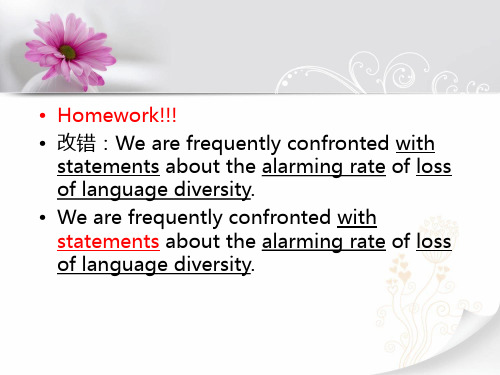
• To rear a child alone are challenging to any parent. • To rear a child alone is challenging to any parent. • b:当主语后跟着with,together with, coupled with,combined with,as well as,like等词引导 的短语时,谓语动词的数跟前面的数保持一致。 • Overworking,coupled with poor diet,lead to physical deneration.
• How we can cope with massive technological change in the 21th century is an interesting issue. • g: the number of +名词复数,后面的谓语动 词用单数 • a number of +名词的复数,后面的谓语动词 用复数; • a huge number of +不可数名词,后面的谓语 动词用单数。
• 助动词,主要有 • do(does,did) be(am, is,are) have(has.had) shall(should) will(would) • 1,助动词be(am,is,are,were)后的动词不能是原 形,一定是动词的现在分词或者是过去分词的形 式。 • The budget of a country should be balance each year.
• The budget of a country should be balanced each year. • 2,助动词可以和实义动词组合成一下几种动词时 态
Goodbye, Free Trade
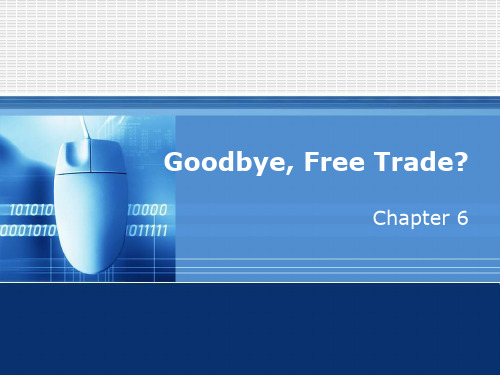
reignite: to make sth. start burning again. e.g. The spat is set to reignite speculation over the future of Yahoo’s investments in Asia. 此次争吵势将重燃有关雅虎在亚洲投资未来走向的猜测。 drag on: you say that an event or process drags on when you disapprove of the fact that it lasts for longer than necessary. 不必要地拖延 ;拖得过久。 e.g. The war may drag on. 战争可能要拖延下去。 How much longer is this going to drag on? 这 事还要拖多久? The conflict with James has dragged on for two years. 与詹姆斯的冲突拖了两年。
Competitive devaluation has been rare through most of history as countries have generally preferred to maintain a high value for their currency. Countries have allowed market forces to work or have participated in systems of managed exchanges rates. An important episode of currency war occurred in the 1930s. As countries abondoned the Gold Standard during the Great Depression, they used currency devaluations to simulate their economies. Since this effectively pushes unemployment overseas, trading partners quickly retaliated with their own devaluations. The period is considered to have been an adverse situation for all concerned as unpredictable changes in exchange rates reduced overall international trade.
三级翻译练习中英版
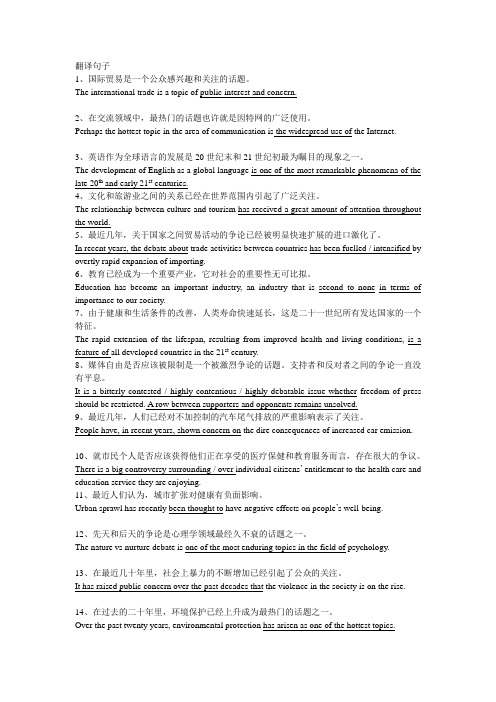
翻译句子1、国际贸易是一个公众感兴趣和关注的话题。
The international trade is a topic of public interest and concern.2、在交流领域中,最热门的话题也许就是因特网的广泛使用。
Perhaps the hottest topic in the area of communication is the widespread use of the Internet.3、英语作为全球语言的发展是20世纪末和21世纪初最为瞩目的现象之一。
The development of English as a global language is one of the most remarkable phenomena of the late 20th and early 21st centuries.4、文化和旅游业之间的关系已经在世界范围内引起了广泛关注。
The relationship between culture and tourism has received a great amount of attention throughout the world.5、最近几年,关于国家之间贸易活动的争论已经被明显快速扩展的进口激化了。
In recent years, the debate about trade activities between countries has been fuelled / intensified by overtly rapid expansion of importing.6、教育已经成为一个重要产业,它对社会的重要性无可比拟。
Education has become an important industry, an industry that is second to none in terms of importance to our society.7、由于健康和生活条件的改善,人类寿命快速延长,这是二十一世纪所有发达国家的一个特征。
free trade VS protectionism全文翻译及感想
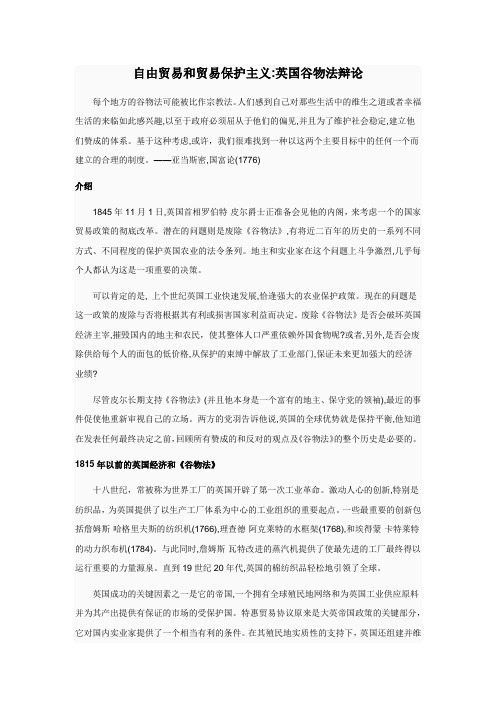
自由贸易和贸易保护主义:英国谷物法辩论每个地方的谷物法可能被比作宗教法。
人们感到自己对那些生活中的维生之道或者幸福生活的来临如此感兴趣,以至于政府必须屈从于他们的偏见,并且为了维护社会稳定,建立他们赞成的体系。
基于这种考虑,或许,我们很难找到一种以这两个主要目标中的任何一个而建立的合理的制度。
——亚当斯密,国富论(1776)介绍1845年11月1日,英国首相罗伯特·皮尔爵士正准备会见他的内阁,来考虑一个的国家贸易政策的彻底改革。
潜在的问题则是废除《谷物法》,有将近二百年的历史的一系列不同方式、不同程度的保护英国农业的法令条列。
地主和实业家在这个问题上斗争激烈,几乎每个人都认为这是一项重要的决策。
可以肯定的是, 上个世纪英国工业快速发展,恰逢强大的农业保护政策。
现在的问题是这一政策的废除与否将根据其有利或损害国家利益而决定。
废除《谷物法》是否会破坏英国经济主宰,摧毁国内的地主和农民,使其整体人口严重依赖外国食物呢?或者,另外,是否会废除供给每个人的面包的低价格,从保护的束缚中解放了工业部门,保证未来更加强大的经济业绩?尽管皮尔长期支持《谷物法》(并且他本身是一个富有的地主、保守党的领袖),最近的事件促使他重新审视自己的立场。
两方的党羽告诉他说,英国的全球优势就是保持平衡,他知道在发表任何最终决定之前,回顾所有赞成的和反对的观点及《谷物法》的整个历史是必要的。
1815年以前的英国经济和《谷物法》十八世纪,常被称为世界工厂的英国开辟了第一次工业革命。
激动人心的创新,特别是纺织品,为英国提供了以生产工厂体系为中心的工业组织的重要起点。
一些最重要的创新包括詹姆斯·哈格里夫斯的纺织机(1766),理查德·阿克莱特的水框架(1768),和埃得蒙·卡特莱特的动力织布机(1784)。
与此同时,詹姆斯·瓦特改进的蒸汽机提供了使最先进的工厂最终得以运行重要的力量源泉。
马克思《关于自由贸易问题的演说》的英文
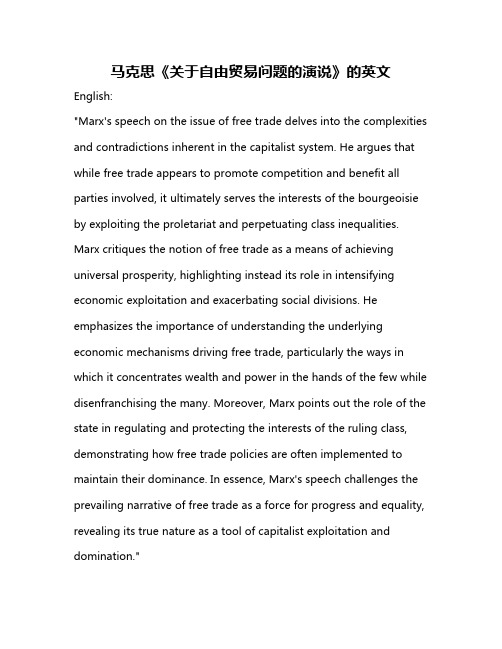
马克思《关于自由贸易问题的演说》的英文English:"Marx's speech on the issue of free trade delves into the complexities and contradictions inherent in the capitalist system. He argues that while free trade appears to promote competition and benefit all parties involved, it ultimately serves the interests of the bourgeoisie by exploiting the proletariat and perpetuating class inequalities. Marx critiques the notion of free trade as a means of achieving universal prosperity, highlighting instead its role in intensifying economic exploitation and exacerbating social divisions. He emphasizes the importance of understanding the underlying economic mechanisms driving free trade, particularly the ways in which it concentrates wealth and power in the hands of the few while disenfranchising the many. Moreover, Marx points out the role of the state in regulating and protecting the interests of the ruling class, demonstrating how free trade policies are often implemented to maintain their dominance. In essence, Marx's speech challenges the prevailing narrative of free trade as a force for progress and equality, revealing its true nature as a tool of capitalist exploitation and domination."中文翻译:"马克思关于自由贸易问题的演讲深入探讨了资本主义制度固有的复杂性和矛盾。
free trade 英文作文
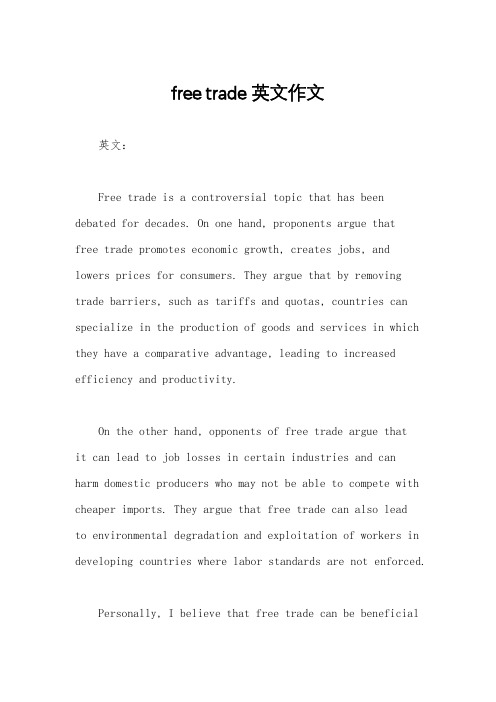
free trade 英文作文英文:Free trade is a controversial topic that has been debated for decades. On one hand, proponents argue thatfree trade promotes economic growth, creates jobs, and lowers prices for consumers. They argue that by removing trade barriers, such as tariffs and quotas, countries can specialize in the production of goods and services in which they have a comparative advantage, leading to increased efficiency and productivity.On the other hand, opponents of free trade argue thatit can lead to job losses in certain industries and canharm domestic producers who may not be able to compete with cheaper imports. They argue that free trade can also leadto environmental degradation and exploitation of workers in developing countries where labor standards are not enforced.Personally, I believe that free trade can be beneficialif it is implemented in a fair and balanced manner. For example, if a country is importing goods from another country that has lower labor standards, it should ensure that those goods are produced in a way that does notexploit workers. Similarly, if a country is exporting goods to another country, it should ensure that it is not causing harm to the environment or violating any human rights.In conclusion, free trade can be a powerful tool for economic growth and development, but it should be implemented in a way that is fair and sustainable.中文:自由贸易是一个备受争议的话题,已经被争论了几十年。
freetrade英文作文
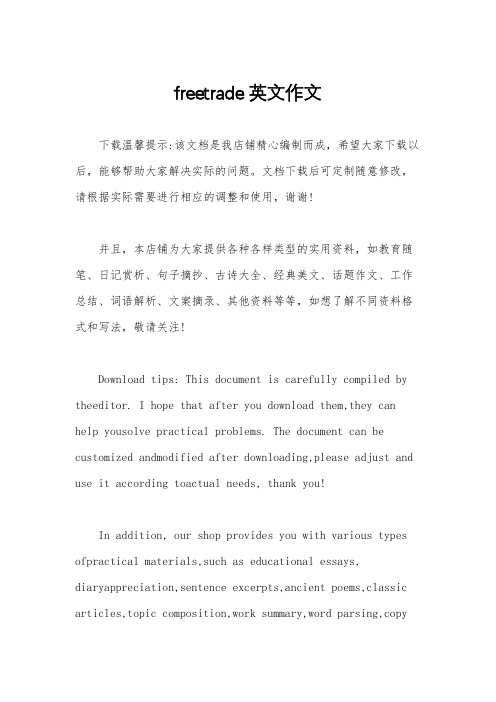
freetrade英文作文下载温馨提示:该文档是我店铺精心编制而成,希望大家下载以后,能够帮助大家解决实际的问题。
文档下载后可定制随意修改,请根据实际需要进行相应的调整和使用,谢谢!并且,本店铺为大家提供各种各样类型的实用资料,如教育随笔、日记赏析、句子摘抄、古诗大全、经典美文、话题作文、工作总结、词语解析、文案摘录、其他资料等等,如想了解不同资料格式和写法,敬请关注!Download tips: This document is carefully compiled by theeditor. I hope that after you download them,they can help yousolve practical problems. The document can be customized andmodified after downloading,please adjust and use it according toactual needs, thank you!In addition, our shop provides you with various types ofpractical materials,such as educational essays, diaryappreciation,sentence excerpts,ancient poems,classic articles,topic composition,work summary,word parsing,copyexcerpts,other materials and so on,want to know different data formats andwriting methods,please pay attention!I love using freetrade because it allows me to investin stocks and ETFs without paying any commissions. It's great to be able to buy and sell shares without worrying about fees eating into my profits. Plus, the app is super easy to use, which is perfect for someone like me who is new to investing.One of the best things about freetrade is the range of stocks and ETFs available to trade. I can invest in companies I believe in and diversify my portfolio with different types of assets. It's also really convenient to be able to access all of this from my phone, so I can keep an eye on my investments wherever I am.I also appreciate the educational resources that freetrade provides. The app offers articles and videos that help me understand more about investing and the stock market. It's important to me to feel informed and confident in my investment decisions, and freetrade helps me do that.Another feature I like is the ability to set up regular investments. I can schedule automatic deposits into my freetrade account, which makes it easy to stick to my investment goals. It's a great way to build wealth over time without having to think about it too much.Overall, freetrade has been a game-changer for me when it comes to investing. It's made the whole process simple, affordable, and accessible. I would recommend it to anyone looking to start investing in the stock market.。
freetrade英文作文
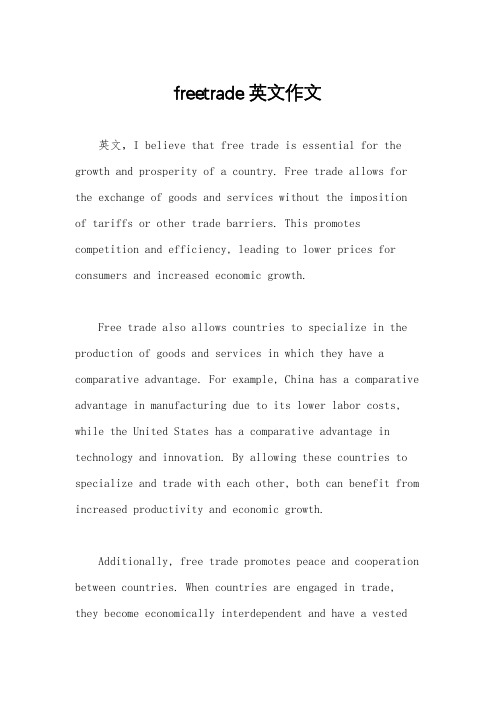
freetrade英文作文英文,I believe that free trade is essential for the growth and prosperity of a country. Free trade allows for the exchange of goods and services without the imposition of tariffs or other trade barriers. This promotes competition and efficiency, leading to lower prices for consumers and increased economic growth.Free trade also allows countries to specialize in the production of goods and services in which they have a comparative advantage. For example, China has a comparative advantage in manufacturing due to its lower labor costs, while the United States has a comparative advantage in technology and innovation. By allowing these countries to specialize and trade with each other, both can benefit from increased productivity and economic growth.Additionally, free trade promotes peace and cooperation between countries. When countries are engaged in trade, they become economically interdependent and have a vestedinterest in maintaining peaceful relations. This can helpto reduce the likelihood of conflicts and promote international cooperation.Overall, free trade leads to lower prices, increased economic growth, and promotes peace and cooperation between countries. It is essential for the prosperity of a country and should be embraced and promoted on a global scale.中文,我认为自由贸易对于一个国家的增长和繁荣至关重要。
自由贸易的英语作文
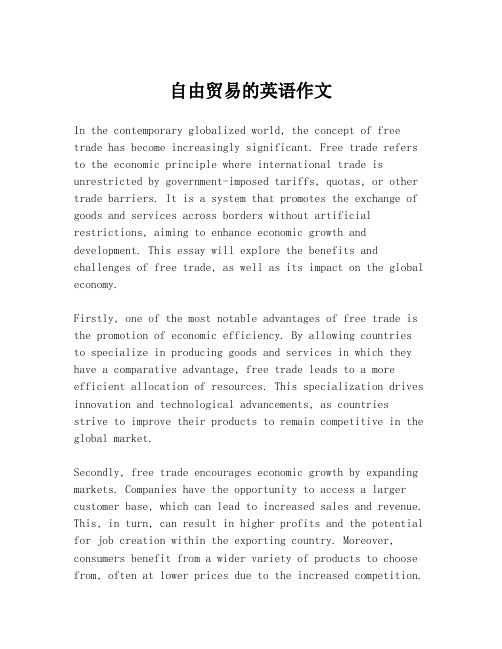
自由贸易的英语作文In the contemporary globalized world, the concept of free trade has become increasingly significant. Free trade refers to the economic principle where international trade is unrestricted by government-imposed tariffs, quotas, or other trade barriers. It is a system that promotes the exchange of goods and services across borders without artificial restrictions, aiming to enhance economic growth and development. This essay will explore the benefits and challenges of free trade, as well as its impact on the global economy.Firstly, one of the most notable advantages of free trade is the promotion of economic efficiency. By allowing countries to specialize in producing goods and services in which they have a comparative advantage, free trade leads to a more efficient allocation of resources. This specialization drives innovation and technological advancements, as countriesstrive to improve their products to remain competitive in the global market.Secondly, free trade encourages economic growth by expanding markets. Companies have the opportunity to access a larger customer base, which can lead to increased sales and revenue. This, in turn, can result in higher profits and the potential for job creation within the exporting country. Moreover, consumers benefit from a wider variety of products to choose from, often at lower prices due to the increased competition.However, free trade is not without its challenges. One of the primary concerns is the potential for job losses inindustries that cannot compete with foreign imports. This can lead to economic displacement and social unrest, particularly in sectors that are labor-intensive and have high production costs. Additionally, critics argue that free trade can lead to a race to the bottom, where countries compete to lower labor and environmental standards in order to attract foreign investment.Another challenge is the issue of fair trade. While free trade aims to remove barriers, it does not necessarily address the power imbalances between developed and developing countries. Developing nations may struggle to compete with the established industries and advanced technologies of developed countries, leading to a widening gap in global wealth distribution.In conclusion, free trade is a complex economic policy with the potential to significantly impact the global economy. While it offers numerous benefits, such as increased efficiency and market expansion, it also presents challenges that must be carefully managed. Policymakers must strive to strike a balance that maximizes the advantages of free trade while mitigating its potential negative consequences. Through thoughtful regulation and international cooperation, the global community can work towards a more equitable and prosperous economic future.。
Free Trade Debate
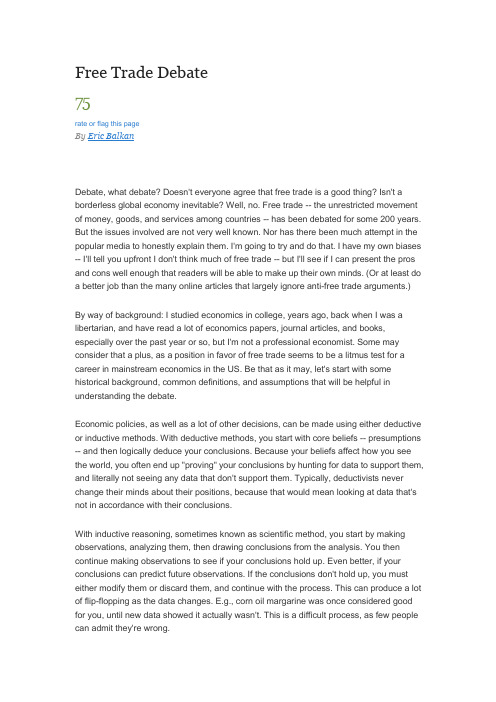
Free Trade Debate75rate or flag this pageBy Eric BalkanDebate, what debate? Doesn't everyone agree that free trade is a good thing? Isn't a borderless global economy inevitable? Well, no. Free trade -- the unrestricted movement of money, goods, and services among countries -- has been debated for some 200 years. But the issues involved are not very well known. Nor has there been much attempt in the popular media to honestly explain them. I'm going to try and do that. I have my own biases -- I'll tell you upfront I don't think much of free trade -- but I'll see if I can present the pros and cons well enough that readers will be able to make up their own minds. (Or at least do a better job than the many online articles that largely ignore anti-free trade arguments.)By way of background: I studied economics in college, years ago, back when I was a libertarian, and have read a lot of economics papers, journal articles, and books, especially over the past year or so, but I'm not a professional economist. Some may consider that a plus, as a position in favor of free trade seems to be a litmus test for a career in mainstream economics in the US. Be that as it may, let's start with some historical background, common definitions, and assumptions that will be helpful in understanding the debate.Economic policies, as well as a lot of other decisions, can be made using either deductive or inductive methods. With deductive methods, you start with core beliefs -- presumptions -- and then logically deduce your conclusions. Because your beliefs affect how you see the world, you often end up "proving" your conclusions by hunting for data to support them, and literally not seeing any data that don't support them. Typically, deductivists never change their minds about their positions, because that would mean looking at data that's not in accordance with their conclusions.With inductive reasoning, sometimes known as scientific method, you start by making observations, analyzing them, then drawing conclusions from the analysis. You then continue making observations to see if your conclusions hold up. Even better, if your conclusions can predict future observations. If the conclusions don't hold up, you must either modify them or discard them, and continue with the process. This can produce a lot of flip-flopping as the data changes. E.g., corn oil margarine was once considered goodfor you, until new data showed it actually wasn't. This is a difficult process, as few people can admit they're wrong.For 200 years, economics has been a battleground between deductive and inductive reasoning. On the deductive side, leading thinkers include David Ricardo, Carl Menger, Karl Marx, Alfred Marshall, Leon Walras, Ludwig von Mises, Friedrich von Hayek, Paul Samuelson, Milton Friedman, Alan Greenspan. On the inductive side, you have Adam Smith, Gustav Schmoller, Thorstein Veblen, John Maynard Keynes, JK Galbraith, and less well-known names, of whom my own favorites include Jared Bernstein and Richard Layard. (I put Samuelson, Friedman and Marx in with the deductivists because, even though they collected observations about the real world, they filtered those observations through a frame of reference set by presumptions and theory.)The deductive method is the one used by what is now referred to as "mainstream" or libertarian economics, and which consists primarily of the neo-classical and Austrian schools of thought. (Please note that the converse is not true -- all deductivists are clearly not libertarians, it's just that they all share the same desire to explain the world via rules.) Libertarian economics basically starts with an interpretation of what Adam Smith -- the "father" of capitalism -- had written in The Wealth Of Nations, continues with David Ricardo's theories, including his theory of free trade called the Theory of Comparative Advantage, and then on into the mathematical modeling pioneered by Marshall and Walras, and taught to multiple generations of economics students via successive editions of the Samuelson textbook and its clones.A lot of the impetus towards the use of math came during the explosion of thinking in physics and hard science in the 19th century. Many economists felt that economics too, could be a hard science. That there ought to be a set of principles governing the economic behavior of human beings, as there was for governing the behavior of atoms. The side effect of using math this way is that you end up with a mechanistic and reductionistic view of the world, being forced to discard whatever you can't provide math for.Now to free trade. Ricaro's Theory of Comparative Advantage, some 200 years old, but still considered the basis of neoclassical free trade thinking, is simple at its heart. It starts from the assumption, as all modern neoclassical theory does, that economic efficiency is the primary goal of economic policy and philosophy. Maximum efficiency would occur with the kind of job specialization that Adam Smith had written about, but taken to a national level. That is, if a country is ideal for producing cotton, and another country has an advantage in building and operating textile mills, then each should concentrate on what it does best, and not try to compete with the other.Ricardo lived in 19th century Britain, which at the time was engaged in both a massive colonization of the world in order to obtain raw materials, and a massive industrializationof its own economy. Ricardo's theory was a perfect match for what Britain was already doing. And it was completely logical. As the Economist magazine has said, talking about another theory: It doesn't matter if a theory has no facts to support it, the theory should not be rejected if it's based on impeccable logic.It's possible to write an entire book about what's wrong with Ricardo's theory, but I'm not going to do that here. I'll just go over the highlights, and then we'll go on to the other arguments in favor of free trade, including the argument from inevitability, the argument about potential trade wars, and the libertarian concept of maximizing freedom.The criticisms of The Theory of Comparative Advantage include:1 - Ricardo assumed that money does not move across borders. That is, a country with an advantage in building factories because it had the money to do so, would not need to worry that its investors would simply move their money to another country, perhaps where labor is cheaper, start up factories there, and so destroy the original advantage of the home country. Critics like economist Herman E Daly note that this assumption doesn't hold up.2 - Historical data seems to indicate that what looks like a natural advantage is often only related to who got into a market first, as the Swiss did with cuckoo clocks. There doesn't seem to be anything in particular about the Swiss national character, or their geography, that would account for their domination of the cuckoo clock market.3 - Government policies can create an advantage for a particular industry in a country by focusing its efforts in that industry, and by absorbing any startup losses. E.g., Japanese government policy re steel and automobile industries, starting decades ago when they realized the dominant US companies were vulnerable.4 - A comparative advantage, and lower costs, can be obtained by unethical means, e.g., forced labor, piracy (of physical goods or intellectual rights), war.5 - Comparision of the relative costs of a product produced in one country vs another takes into account only what economists call internal costs, and not external costs. That is, the price paid for a Chinese lamp by a consumer at Walmart versus the US-made lamp formerly available does not take into account the cost of unemployment of theformerly-employed US workers, the global environmental damage caused by the Chinese manufacturer, or the additional risk of using the product given the lower state of product safety and testing in China.As part of neoclassical theory, the free trade model also has to contend with objections to neoclassical theory in general:1 - As economic efficiency is the main goal of neoclassical economics, "softer" goals like the general happiness of society are ignored. Studies show that unemployment has a much more deleterious effect on a society than lower consumer prices have a benefit. But things like unemployment, ecological damage, damage to family relationships from employee relocation, are not counted by neoclassical economists because, simply, there is no way to quantify them and so they can't be plugged into a mathematical model. French economist Leon Walras is reported to have said: if you can't model something mathematically, it's not worth studying.2 - The nature of mathematical modeling is such that it works best with a closed system.E.g., you need to know what all of the inputs are in order to create the model, and then keep anything else in the real world from affecting the system. But in the real world there are billions of potential interactions, many with unpredictable results. They can't all be turned into variables, and they certainly can't all be prevented from affecting the system you're studying. In other words, closed systems don't actually appy to real people. Which means the models don't apply to real people. Psychologists have done studies with real subjects that have produced entirely different results than what was expected from mathematical models, including those using the Nash Equilibrium.3 - Neoclassical theory is based on a concept of individuals acting in their own rational self-interest, making choices that maximize the value to themselves. (Competing theories say the world is uncertain, and information is unevenly distributed, so less-than-optimum choices are often made.) Numerous psychological studies have not supported this concept of rational self-interest. People often act on behalf of their family or group, rather than individually, and often on a basis of fairness rather than self-interest. Further, neurological studies have shown that people use both their rational and emotional neural circuits at the same time, in making a decision.To be fair, I have to say that many neoclassical economists do allow a role for the government in the economy. But they don't seem to extend this to trade, which they still view as an all-or-nothing, black-and-white issue when it comes to government intervention.The arguments in favor of free trade don't stop with Ricardo, of course. Let's start with the libertarian argument that government is the problem, and not the solution. Libertarians believe in maximizing individual freedom. To do this, they espouse laissez-faire capitalism, in which the government only serves to provide a police/legal function, and possibly national defense. Under this theory, any government regulation of trade is wrong on its face, because it introduces government into the private sector. In its extreme form, espoused by Friedrich von Hayek in "The Road to Serfdom", any government intervention into the economy is collectivism, and any little bit of collectivism leads to totalitarianism. I don't recall, when I read this years ago, if Hayek made an exception for public libraries orcity fire departments, but you get the drift. (Actually, New York City fire departments were once private, but after too many houses burned down while competing fire companies argued about who would be paid, the City took over that function.)LIbertarianism doesn't do well when measured against history. The US followed a very libertarian path in the 19th century. But for various reasons, such as labor unrest, financial panics, unhealthy/unsafe living conditions, Americans largely came to believe that there was a proper place for government in the economic sphere. I say "largely" because there is still a strong undercurrent of libertarianism in the US, especially among economists.In terms of free trade, the libertarian approach, for instance, is not for the government to be proactive in preventing unsafe products like lead-based painted toys to enter the US, but for consumers to sue the vendor of those products after the damage, if any, has been done. This eliminates, according to libertarians, expensive recalls of entire product lines when perhaps only a few items are affected. The idea here is that if vendors are successfully sued by the victims, or by the relatives of the victims if deceased, they will make their products safer.The criticisms of libertarian economic policy, again, could fill a book. But here are some highlights:1 - It requires giving human life a value (for court judgments). In the infamous Ford Pinto exploding gas tank case, Ford did a cost-benefit analysis showing that spending $11 per car would cost more than the legal settlement at $224,000 a pop for each of an expected 50 people dying in fires caused by rear-end collisions. So Ford didn't spend the $11. (This kind of CBA often accompanies libertarian economic thinking.) Ford felt justified in making this decision. However, this kind of thing -- where people die needlessly through no fault of their own --- doesn't sit well with the public's sense of fairness. The libertarian response to this might be that Ford should have figured in the additional cost of their internal documents being leaked and their getting unwanted negative publicity. So their CBA should have taken this into account, and used different numbers, which might have produced a different decision. Yet, I think most people would feel that's not the right answer. (As an aside, it can be very difficult to even make a court case when a product has a very slow effect on health, such as tobacco does.)2 - Libertarianism leads to a concentration of economic and political power into fewer and fewer hands, producing a kind of oligarchic system that some have called "corporate mercantilism", as opposed to the free market capitalism libertarians originally intended. In The Wealth of Nations, Adam Smith had disparaged multi-national corporations, like the British East India Company, for doing just what multi-national corporations do today -- restraining trade. Modern defenders of libertarian economics don't seem to have noticed that corporations try to reduce competition, not increase it. And, as Smith noted about theBritish East India Company, they pursue profit in the nearly complete absence of any ethics. Interestingly, common sense sayings like "He who has the gold, makes the rules" seem to have escaped libertarian economists.3 - The free market has no provision for resolving problems that society has to face as a whole. That's why libertarian economists make an exception for national defense -- it wouldn't make sense for everyone to arrange his own defense. Libertarian economists also need to make a similar exception for ecological damage. But, instead, the thinking seems to go something like this: given that the free market can solve any problem, and there is no free market solution for global warming, ergo, global warming must not be a problem.Sidebar: neoclassical economics is very much related to neoliberal politics. That phrase is used more outside the US than in, but it's a useful phrase. It's related to "classical liberalism" and to libertarianism, but whereas libertarian economics inadvertently degrades into corporate mercantilism, neoliberals welcome corporate mercantilism as a good thing. They approve of multi-national corporations, and even the neoconservative policy of the government aiding MNCs. Inequality is good. Greed is good. Many neoliberals derive much of their income from investments, as opposed to wages, so it's not hard to see where they're coming from.But maybe free trade, despite its theoretical flaws, actually works? Well, no. For some 30 years, the World Bank and the IMF have provided assistance to countries in need on the proviso that they adopt free trade policies. But the World Bank has admitted this hasn't worked well. Others say that this is putting it mildly, that it's been a disaster, e.g., the documentary "Life and Debt".I said earlier I would cover the bugaboo of trade wars. Since the start of the US, the federal government has protected "infant industries", a term coined by the first Secretary of the Treasury, Alexander Hamilton. It's also protected a lot of other industries. Through much of the 19th century, when Britain had zero tariffs -- no tax on imported products -- the US had tariffs of 30-50%, much higher than today. In 1930, the US Congress, worried about a coming depression, passed the Smoot-Hawley Bill which raised tariffs. According to libertarian analysts, other countries followed suit and this deepened the coming depression. That seems like a fairly speculative statement. If we stick to the facts, we note:- By 1929, the year of the stock market crash, the US had gotten caught up in a feeling of irrational exuberance, to borrow a phrase. For instance, despite the fact that pretty much every family in the US that could afford to operate a car already owned one, Ford was still rolling cars off their assembly lines at full speed. It's not like there was a big export market either, as Europe had its own car companies and the undeveloped world couldn't affordthem. Ditto for radios, locomotives.... The market for these products was no longer there, and so layoffs were inevitable -- thus further reducing the market, as unemployed people with no unemployment compensation don't spend much. On top of this, many people were speculating in the stock market on 5% margin, meaning that their money could be entirely wiped out by even a small drop in stock prices, which was inevitable once sales stopped growing. Then, after the Depression got underway, libertarian economists insisted that the government not take any action -- that this was a problem of people not saving enough money, as opposed to the obvious problem being that they weren't spending and investing enough. Eventually, WWII broke out, the government was forced to spend and to provide people with jobs, and the Depression ended. That's an oversimplification, but I think you can see deductivist thinking at work where only facts in accordance with a particular theory are considered, and any other facts are ignored.- Japan has always had very high tariffs, but no one has engaged them in a trade war. Also, none of the Asian economies, except South Korea, has a free trade policy. For instance, the Chinese government owns 50% of most of China's largest companies, the SOES. That hardly describes the free trade model, where government keeps out of the economy.- The US has put a 49 cent a gallon tariff on Brazilian ethanol, to protect our own ethanol producers. This hasn't sparked a trade war either. If I may make an observation, it appears that we have tariffs on products that help the largest corporations, especiallyagri-business, and low or no tariffs where it would hurt those corporations. That's not really free trade. The trade war argument seems to serve a boogeyman function.Now we're down to the final argument in favor of free trade: the case for the borderless economy. (Well, if you think of other arguments, email me.) There is an ongoing debate between proponents of a global economy and those favoring the localized economy. I won't get into that here. Let's just assume for the moment, just for purposes of discussion, that globalization is the toothpaste that can't be put back into the tube. The question then becomes: should globalization be monitored and regulated, or should it be borderless, with unrestricted movement controlled not by governments but by commercial entities, i.e., MNCs. Illegal drugs are essentially borderless already. Despite a huge expenditure over the years, the US hasn't been able to do much to stop it. Ditto for illegal immigration. Even though it's harder to hide people than drugs, the government doesn't seem to have stopped this flow any better than the one for illegal drugs.Well, if borderless flows can't be completely regulated, is it worth it to just try and regulate them as much as possible? It does, in a social contract (i.e. cooperative agreement) type of society where the public chooses what kind of society it wants to have, and uses the government to establish rules that at least try to create that society.If you opt for for a social contract in which people understand they must compromise with each other in order to live together, and decisions should be made on what's fairest for everyone, then a trade model that puts people out of work, allows dangerous products into the country, allows foreign manufacturers to make more money the more unethical they are... Well, that can't possibly be a good idea. And if it's not a good idea, it should be opposed, even if the battle is uphill all the way.- Eric Balkanericbalkan@http://ibrakefortrees.wordpress.co。
自由贸易的英语作文
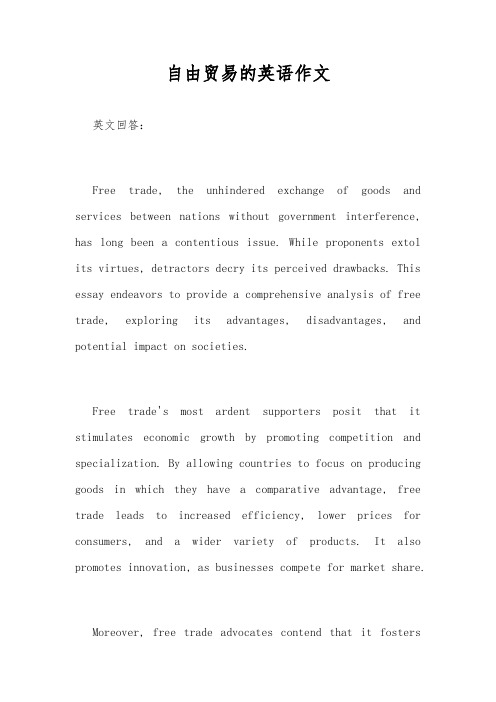
自由贸易的英语作文英文回答:Free trade, the unhindered exchange of goods and services between nations without government interference, has long been a contentious issue. While proponents extol its virtues, detractors decry its perceived drawbacks. This essay endeavors to provide a comprehensive analysis of free trade, exploring its advantages, disadvantages, and potential impact on societies.Free trade's most ardent supporters posit that it stimulates economic growth by promoting competition and specialization. By allowing countries to focus on producing goods in which they have a comparative advantage, free trade leads to increased efficiency, lower prices for consumers, and a wider variety of products. It also promotes innovation, as businesses compete for market share.Moreover, free trade advocates contend that it fosterspeace and cooperation between nations. When countries are economically interdependent, they are less likely to engage in conflict. This interconnectedness also facilitates cultural exchange and understanding, leading to greater global harmony.However, opponents of free trade express concerns about its potential negative consequences. They argue that it can lead to job losses in industries that face increased foreign competition. This can particularly affect workers in low-skill, labor-intensive industries. Additionally, detractors contend that free trade can exacerbate economic inequality, as profits from increased trade often accrue disproportionately to a select few.Furthermore, critics argue that free trade may undermine environmental and labor standards. Without government oversight, businesses may be tempted to relocate to countries with lax regulations, leading to lower environmental protections and worker exploitation. This can have detrimental effects on the health and well-being ofcommunities in those countries.Despite these concerns, free trade remains a cornerstone of the global economy. Its proponents maintain that its benefits outweigh its potential drawbacks, arguing that the gains in economic growth, innovation, and international cooperation far surpass any negative consequences.中文回答:自由贸易是指各国在政府不干预的情况下自由交换商品和服务。
有关国际贸易英语作文高中
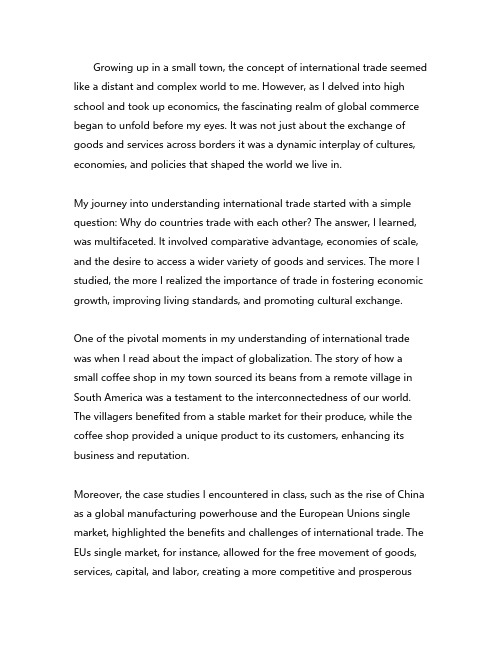
Growing up in a small town, the concept of international trade seemed like a distant and complex world to me. However, as I delved into high school and took up economics, the fascinating realm of global commerce began to unfold before my eyes. It was not just about the exchange of goods and services across borders it was a dynamic interplay of cultures, economies, and policies that shaped the world we live in.My journey into understanding international trade started with a simple question: Why do countries trade with each other? The answer, I learned, was multifaceted. It involved comparative advantage, economies of scale, and the desire to access a wider variety of goods and services. The more I studied, the more I realized the importance of trade in fostering economic growth, improving living standards, and promoting cultural exchange.One of the pivotal moments in my understanding of international trade was when I read about the impact of globalization. The story of how a small coffee shop in my town sourced its beans from a remote village in South America was a testament to the interconnectedness of our world. The villagers benefited from a stable market for their produce, while the coffee shop provided a unique product to its customers, enhancing its business and reputation.Moreover, the case studies I encountered in class, such as the rise of China as a global manufacturing powerhouse and the European Unions single market, highlighted the benefits and challenges of international trade. The EUs single market, for instance, allowed for the free movement of goods, services, capital, and labor, creating a more competitive and prosperouseconomic zone. Yet, it also raised questions about labor rights, environmental standards, and the impact on local industries.In high school, we were also exposed to the darker side of international trade through discussions on trade imbalances, protectionism, and the exploitation of workers in developing countries. The debate on whether free trade was beneficial or detrimental to a nations economy was particularly engaging. While some argued that it led to job losses and a race to the bottom in terms of labor and environmental standards, others contended that it promoted efficiency, innovation, and consumer choice.My curiosity about international trade was further piqued when I participated in a school project where we simulated the experience of running a global business. We had to make decisions about sourcing raw materials, manufacturing processes, and marketing strategies, all while considering the economic, political, and social factors that could influence our business. This handson experience helped me appreciate the complexities and strategic considerations involved in international trade.As I reflect on my high school years, I am grateful for the opportunity to explore the world of international trade. It has not only broadened my understanding of global economics but also instilled in me a sense of global citizenship. I now see trade as a powerful tool for development and cooperation, one that can bridge divides and create shared prosperity.Looking ahead, I am excited to continue learning about international trade and its role in shaping our world. Whether its through further studies,internships, or future career opportunities, I am eager to contribute to the ongoing dialogue on how we can harness the power of trade for the betterment of society and the planet. The lessons I have learned in high school have laid a solid foundation, and I am ready to take the next step in my journey to become a global citizen and a responsible participant in the international trade community.。
国际贸易
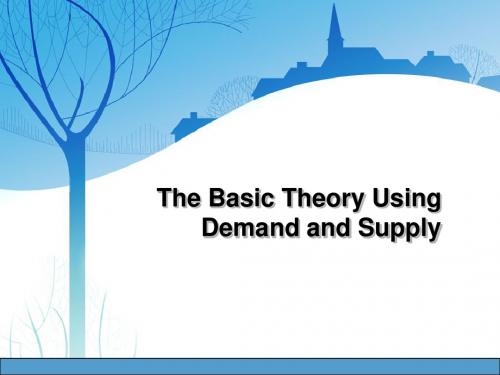
7
• The Shape of the Demand Curve(需求曲 线): downward sloping (向下倾斜)
8
Figure 2.1 Demand and Supply for Motorrplus (消费者剩余)
• Consumer Surplus: The net gain from the difference between the value that consumers place on the product and the payment that they must make to buy the product. • The Increase in the Consumer Surplus • The Corresponding Areas(对应区域) Shown in Figure 2.1
20
Free-Trade Equilibrium (自由贸易均衡)
• The Effects (效应)of International Trade on the market prices: 1. The market price decreased in the United States. 2. The market price increased in the rest of the world. • Free-trade equilibrium price, international price, world price
15
• The Increase in the Producer Surplus • The Corresponding Areas(对应区域) Shown in Figure 2.1
16
Figure 2.1 Demand and Supply for Motorbikes
2019年上海高考英语一模翻译汇编
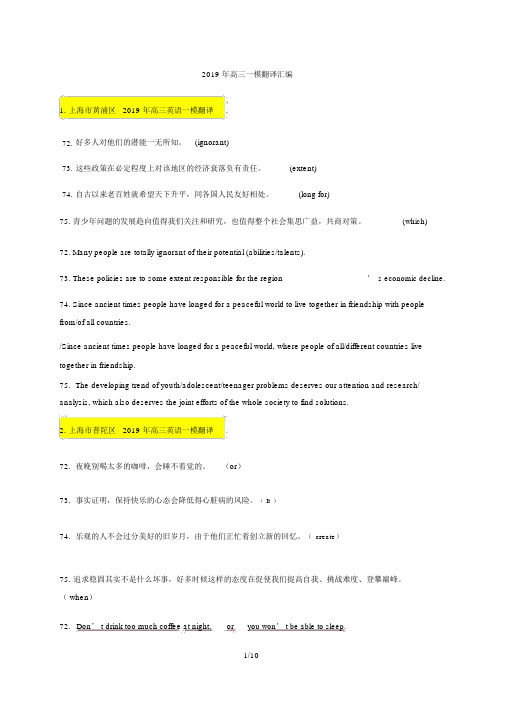
2019 年高三一模翻译汇编1.上海市黄浦区 2019 年高三英语一模翻译72.好多人对他们的潜能一无所知。
(ignorant)73.这些政策在必定程度上对该地区的经济衰落负有责任。
(extent)74.自古以来老百姓就希望天下升平,同各国人民友好相处。
(long for)75. 青少年问题的发展趋向值得我们关注和研究,也值得整个社会集思广益,共商对策。
(which)72. Many people are totally ignorant of their potential (abilities/talents).73. These policies are to some extent responsible for the region’ s economic decline.74.Since ancient times people have longed for a peaceful world to live together in friendship with people from/of all countries./Since ancient times people have longed for a peaceful world, where people of all/different countries live together in friendship.75.The developing trend of youth/adolescent/teenager problems deserves our attention and research/ analysis, which also deserves the joint efforts of the whole society to find solutions.2.上海市普陀区 2019 年高三英语一模翻译72.夜晚别喝太多的咖啡,会睡不着觉的。
- 1、下载文档前请自行甄别文档内容的完整性,平台不提供额外的编辑、内容补充、找答案等附加服务。
- 2、"仅部分预览"的文档,不可在线预览部分如存在完整性等问题,可反馈申请退款(可完整预览的文档不适用该条件!)。
- 3、如文档侵犯您的权益,请联系客服反馈,我们会尽快为您处理(人工客服工作时间:9:00-18:30)。
The debate about free tradeAbstractIn the process of globalization, what is one country …s goal which shall be pursuit? What the means should be taken to achieve their goals? Should opening up free trade deeply Or take trade protection? what kind of trade relationship between nations in is mutually beneficial? When the benefit between country and import and export companies is different?.And so on. Facing a series of problems ,economists‟ answer is extremely cautious .it is very difficult to find a economist who advocates free trade and avoids the protection of champagne completely .Also it will be difficult to find a economist who accepts complete protection and deny free trade ,this fits the objective economic state conform. Because, as long as one country participates in international trade, the country must ask the free trade and trade protection .of course, the truth is always that home countries always hope their trade partners implement free trade, and to its own economic implement moderate protection.For a long time there has been a contest between free trade and trade protection as the best strategy of promoting local and global economy. When the globe is again in the midst of economic recession, this contest intensifies. The current recession knocks out a severe blow to free trade as the “game rules” of world economy and aggravates the perplexities of free tra de in certain aspects, which then arouses suspicion on the legitimacy of free trade. In order to address domestic economic and social problems, the “stimulus packages” of some countries offer much support to trade protection, further intensifying this contest. Confronted with the global economic disaster, trade protection can be helpful for alleviating the pressure in a given economy and thus mitigating domestic contradictions in a short period, but it may also complicate the legal order of trade and bring hindrance to domestic markets as well as international ones, and consequently, it will jeopardize the rights and interests of ordinary consumers and even stir up the grievance and resentment domestically or internationally. As the current economic recession has been a pressing issue for all the countries, there is a dire need for concerted efforts in the globe to stimulate the vigor of world economy and tide over the disaster.Free trade is the pursuit of WTO values ,and the theory of comparative advantage is the main theory for WTO. However ,WTO does not solve the national interests of the differences between countries as well as uneven distribution of benefits of trade and other practical issues ,and comparative advantage theory itself .WTO cannot radically eliminate trade protectionfactor ,so ,when the WTO promotes trade liberalization , allows member countries to adopt appropriate trade protection police ,for the member countries finding a best position to achieve their own interests and promote further cooperation. The essence of the trade protection under trade liberalization is the compromise of WTO ideal and the reality.Free Trade and ProtectionismP rotectionism helps to protect nations from an increase in the amount of imports, which could affect domestic production. One of the most common protectionist policies includes raising the price of imports via tariffs, keeping industry in the nation more competitive in the domestic market, according to Humboldt State University. Protectionism can also include import quotas, or the restrictions on the quantity of imports allowed to enter a country.Free trade, on the other hand, lifts barriers to allow for the free flow of trade between two or more nations. Trade agreements can foster economic growth by increasing trade for a nation. Free trade opens markets and economic opportunities. Free trade allows for fair competition andnon-discriminatory regulations, according to the Office of the United States Trade Representative The debateA long-standing debate in development economics has been the one between advocates of free trade and proponents of protectionism in developing countries. While the former argued that free trade would offer large opportunities for poor countries to improve their situation, the latter considered trade to be harmful to poorer countries and typically preferred a combination of protectionism and development aid. This opposition tended to dominate the discussion about the role of international trade in the Third World. (Bhagwati (1993), Krueger (1990))In“How fair is fair trade”we can say free trade is not beneficial to small developing countries. A third position has come up. This position maintains that international trade can be beneficial to developing countries as long as it is performed in a just manner. But manner is not accepted by every counties.From the integration of the world economy point, or like, Adam Smith that the global economy as a big family, free trade has Obviously higher efficiency. Trade promote division, and division improve the professional and the production efficiency. Also the trade promote the demand and supply and the increase in turn promote the trade development.Trade protectionism setting t rade barriers, and to reduce the efficiency, including the production efficiency and trading division of efficiency, restrain competition and innovation, increasing the transaction cost, cause the social welfare loss.In fact ,free trade may bring some disaster to some countries. Untapped markets become promising after countries and regions make changes in their internal political and economic structure. Emerging markets may change, however, because they are subject to political, military and environmental influences. Some nations lose investors and exporters due to political instability, unfair trade practices and economic uncertaintypeople agree that free trade is a mixed blessing. As for whether free trade is beneficial for the poorest in society, even economists are divided. Competition drives down wages and makes companies cut corners on healthcare for their poorest workers. In other words, free trade directly and indirectly damages the health of the poor. According to a recent article, article, "Is TradeGood for Your Health?" in the Review of International Economics, economists Ann L Owen and Stephen Wu of Hamilton College build on an increasingly strong, but rarely reported, body of literature demonstrating the health benefits of free trade. Owen and Wu conclude that openness to trade and higher volumes of trade are powerfully associated with reductions in infant mortality and increases in life expectancy, particularly among women in developing countries. As Owen and Wu's findings sugge st, free trade would do more for the health of the world's poor than the most generous acts of charity.In the book” Free Trade Today “, Bhagwati could not be on more solid ground on the funda mental question of whether free trade is good policy. His sophisticated, far ranging, and practical defense of free trade places the doctrine on a more solid footing than ever. When we consider that government officials often lack sufficient information or pure motives, free trade becomes the first, best policy-even if a higher state of domestic welfare could be reached in theory if just the "right" policies were implemented. Two centuries after Adam Smith, free trade remains a broad, secure, and accessible ledge high up the mountainside of good government policy. Jagdish Bhagwati wisely warns us in Free Trade Today that those final icy feet to the summit are not worth the risk.Free trade connotes open but orderly competitions. The rules of multilateral trading system, the WTO, reached on mutual consent through negotiations or bargaining among its members, favored a competitive order of free trade. However, because developing countries and developed ones were not at an equal start in many aspects within the WTO, these rules, seemingly fair and just, often lead to unequal outcomes of trade. Furthermore, some developed countries always hold domin ant positions in the global economy and possess “justifiable, beneficial and powerful” comparative advantages in international trade competitions. By contrast, most developing countries are frequently on passive and inferior status in these aspects. This long-lasting disparity is also likely to affect the unfair competition outcome in the future international trade. If developing countries‟ voice is weak, if any, with regard to global issues, the rules will be inappropriate and expensive for poor countries.7 In particular, developing countries may fear that they will be “crowded out” by developed countries in terms of access to world trade in the current global economic recession. In some key aspects, however, fair treatment and wealth acquisition can be mutually influential. Thus, the legal system of free trade for fair competitions can improve the sustainable increase and the development of economy and enable poor countries to participate in international society and reduce poverty.WangYingbo write in his paper that “One country‟s trade policy like a tug of war between trade protection and free trade, sometimes to the left, and sometimes to the right. His idea is that when the economic downturn, trade protectionism have advantage; but when economic become prosperity, free trade is on the upper hand, in economic development Process they appear alternately. Generally speaking, in international trade ,competitive states tend to free trade, weak competitiveness countries tend to trade protection. Protection and freedom are relatively.In “Do Free Trade Agreements Increase Economic Growth of the Member Countries?”Jung Hur utilize an alternative trade openness measure, which implies …mutual‟ trade liberalization, and the nonparametric matching approach, in order to determine whether an FTA exerts an effect on the growth of the two countries involved in the FTA. The principal finding of this paper is that FTAs appear to exert an insignificant effect on growth performance from the nonparametric matching approach. An FTA has an insignificant effect in the one- to 10-year period after the launch of the FTA. However, more importantly we have found an upward trend in the gap between the growth rates of per capita GDP among countries within an FTA. This implies that uneven FTA effects exist across countries within an FTA. Some countries within FTA systems appear to enjoy positive FTA effects on economic growth, whereas their FTA partners might experience negative FTA effects on their economic growth rates. This result shows that trade policy makers should not consider FTAs as a strategy that guarantees rapid economic growth. Thus, caution should be exercised in the design of FTAs in order to ensure the FTA‟s positive effectsFree Trade Today is a great read for all those interested in international trade and development, regardless of their ideological stance. It offers deep insights of a powerful idea not only to those fogged by rhetoric and misinformation, but also to many of its strong supporters.LiWenlong writes in his article “The essence of the WTO is the compromise with Ideal and reality” WTO continues to promote trade liberalization and at the same time allows member countries to take moderate trade protection measures. In the practical application of WTO, embodies Effective unity and coexistence to the contradiction. Therefore, the future development of the WTO policy trend should be moderate trade protection Under the free trade trend.Member nations of the World Trade Organization have reconsidered protectionist policies. The WTO has no laws or rules prohibiting banks from lending only in their own domestic markets, which could lead financial institutions based in other countries to withdraw investments, reports the Washington Post. The World Trade Organization has said that protectionism could prolong the current global economic recession, according to the Post. Since 2008 a number of nations have increased tariffs, applied import restrictions and reinstated subsidies. In addition, some countries have imposed financial protectionism, requiring financial institutions based in their countries to invest in domestic companiesConclusionEither free trade or trade protection is an approach essentially to acquire trade interests for countries. When the current global economic recession has become a pressing issue for all countries, however, there is a dire need for collective global action to properly coordinate the relationship between free trade and trade protection and to restore the vigor of the world economy as a whole. Open economy will be in a better position to stage a faster and stronger recovery from the crisis. But in the midst of the current economic recession, trade protection, seemingly a matter of course, is likely to invite trade conflicts between the countries. Many conflicts, especially quarrels over interest divergences, have to do with the existent common and fundamental interests of the parties, but most of them are negotiable. “In the terminology of game theory, most interesting international conflicts are not …constant-sum games‟ but‟ va riable-sum games‟: Thesum of gains of the participants involved is not fixed so that more for one inexorably means less for the other.” In practice, it is true that one party‟s ability to get an upper hand in the negotiation is closely related to others‟ decisions, but it is fundamental to admit that “there is a powerful common interest in reaching an outcome that is not enormously destructive of values to both sides.”48 Even though free trade allows for value discrepancy, this does not implicate unfairness. Only by equal access to trade can all the countries cooperate in world trade and effectively settle trade conflicts among them. On the one hand, free trade broadens the room of competition for countries to seek opportunities. On the other hand, if countries become closely connected, theiri nter dependence inter se will also be greatly enhanced. Nevertheless, this situation does not mean that “One country can promote its economy at the expense of the other‟s total interests, nor the other country will suf fer a loss if one country obtains its interests of free trade.”Given the adverse effects of free trade, it is necessary for a country to properly intervene, but this is by no means an excuse for trade protectionism. Many facts have convincingly told that the legal system of free trade is superior over a government-dominated trade framework in promoting economic development and making efficiencies. Competitions for trade interests will further intensify with the advancement of free trade, which makes it even more significant to reconcile the conflict between free trade and trade protectionism. The competitive areas are not pure battlefields, but areas of potential interdependencies as well as cooperation. Therefore, the global economicrecovery depends on the international society‟s ability to restore the confidence of countries in free trade.References1 Free Trade Today Free Trade Today, by Jagdish Bhagwati2 Free Trade Agreements Increase Economic Growth of the Member Countries? Jung Hur World Development Volume 40, Issue 7, July 2012, Pages 1283–1293 How fair is fair trade? Maseland, Robbert; de Vaal, Albert. De Economist150. 3 (Sep 2002): 251.4 贸易保护主义与自由贸易主义之争王迎波;经济导报社领导之友, , 编辑部邮箱2009年03期5 自由贸易趋势下的适度保护贸易:WTO理想与现实的妥协黎文龙; 湖南文理学院学报(社会科学版), Journal of Hunan University of Arts and Science(Social Science Edition), 编辑部邮箱2008年03期6 How fair is fair trade Maseland, Robbert; de Vaal, Albert. De Economist150. 3(Sep 2002): 2517 [Free trade: risks & rewards] Grayson, Kyle; MacDonald, L Ian. Labour 48(Fall 2001): 290-292.8 How fair is fair trade? Maseland, Robbert; de Vaal, Albert. De Economist150. 3(Sep 2002): 251.。
